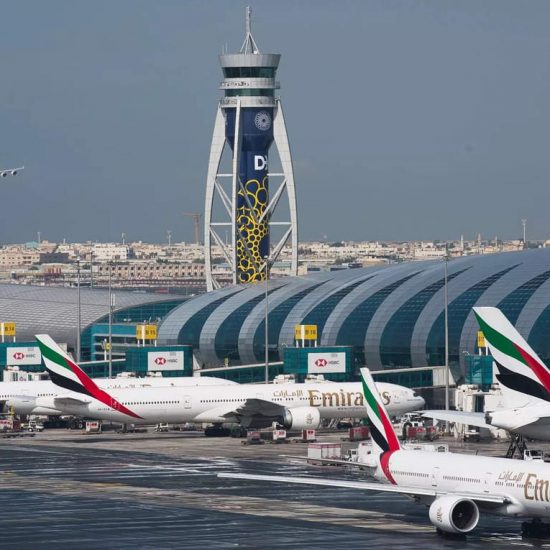Almost every Middle Eastern stock index declined after oil, the region’s main source of income, sank to the lowest in seven years, damping the outlook for government spending.
Dubai’s DFM General Index ended its longest winning streak in almost three months, sliding 1.5 percent, the most in a week, to close at 3,026.05. Emirates NBD PJSC’s 4 percent retreat was the biggest contributor. The Tadawul All Share Index in Saudi Arabia lost 1.6 percent, also the most in seven days. The kingdom boosted its crude exports in October.
The retreat reflects the crunch countries in the Gulf are feeling as the plunge in oil curbs government revenue. Kuwait and Qatar said they will issue debt to cover rising budget deficits, even as bank liquidity is drying up and some central banks in the region raise borrowing costs in line with the Federal Reserve. The six-member Gulf Cooperation Council, which includes Saudi Arabia and the United Arab Emirates, is home to about 30 percent of the world’s oil. Saudi Arabia, the Arab world’s biggest economy, may announce next year’s budget this week.
“I don’t recommend buying anything in the market at the moment because oil hasn’t bottomed yet and global markets are still weak,” said Hisham Khairy, the Dubai-based head of institutional trade at Mena Corp. Financial Services LLC.
Brent crude, a pricing benchmark for half the world’s oil, dropped to $36.88 a barrel on Friday after an increase in the number of oil rigs in the U.S. signaled the glut that has sent prices tumbling will be prolonged. The S&P 500 last week posted its biggest two-day drop in more than three months and the Stoxx 600 fell as investor concerns over global growth resurfaced.
A Bloomberg index of the leading 200 stocks in the region declined 1 percent on Sunday, the most in a week.
Banking stocks had surged on Thursday on hopes that higher interest rates would improve lending margins, but “the so-called market euphoria following the U.S. interest rate hike on Wednesday was short-lived,” said a Jeddah-based trader.
“Some traders turned a quick profit and sold positions, and they are not willing to re-enter the market until the budget is announced.”
Real estate related stocks, which make up most of Dubai’s market value, declined. Arabtec and DAMAC Properties led the retreat, tumbling 3.7 and 3.0 percent respectively.
Abu Dhabi’s index recouped early losses and closed 0.2 percent higher in the heaviest trade since the beginning of the month, gaining for the third straight session. First Gulf Bank rose 1.6 percent, and is up 11.7 percent over the past week.
Dana Gas, the most heavily traded stock on the bourse, jumped 11.1 percent in its heaviest trading since July.
The surge was partly due to a “catch-up effect” after Dana’s shares were suspended on Thursday, and partly because of a statement issued by Dana on Sunday reiterating that it had settled a business dispute with Germany’s RWE and clarifying details of the settlement, said Sanyalaksna Manibhandu, senior analyst at Abu Dhabi’s NBAD Securities. Qatar’s exchange was closed for a national holiday.-Bloomberg, Reuters
Just in:
Dubai and Switzerland Forge Stock Market Link to Boost Investment Reach
//
Rahul Gandhi Gets A Morale Boosting Endorsement From A Most Unexpected Quarter
//
Young imaginations take flight at Sharjah Children’s Reading Festival
//
Dubai Doubles Down on Sports with New Stadium Approvals
//
Alhashmi Secures Second Term as Ju-Jitsu Asian Union President
//
Ruler of Ras Al Khaimah Extends Condolences to Saudi King
//
Andertoons by Mark Anderson for Sun, 05 May 2024
//
Brazil and Japan Forge Pact to Safeguard Amazon
//
Red Crescent Equips Communities with Vital Skills Through First-Half Training Blitz
//
UAE President Hails Armed Forces as Nation’s Guardians and Catalysts for Growth
//
Archipelago Nation Sets Course for Bioethanol Boom
//
Sharjah Reading Center Sparks Young Minds Through Playful Learning
//
Wayanad reacts to Rahul agreeing to contest from Raebareli
//
Abu Dhabi Aims for Zero Traffic Fatalities with New Strategy Development Project
//
UAE Minister Champions Intellectuals as Guardians of Human Values
//
Rising Floodwaters in Southern Brazil Leave Trail of Devastation
//
Reliance Industries Ventures into WTI Midland Crude Market
//
Andertoons by Mark Anderson for Sat, 04 May 2024
//
Wikipedia Affirms Its Place in the AI Age
//
Sharjah Award Recognizes Artistic Achievements of Disabled People
//








